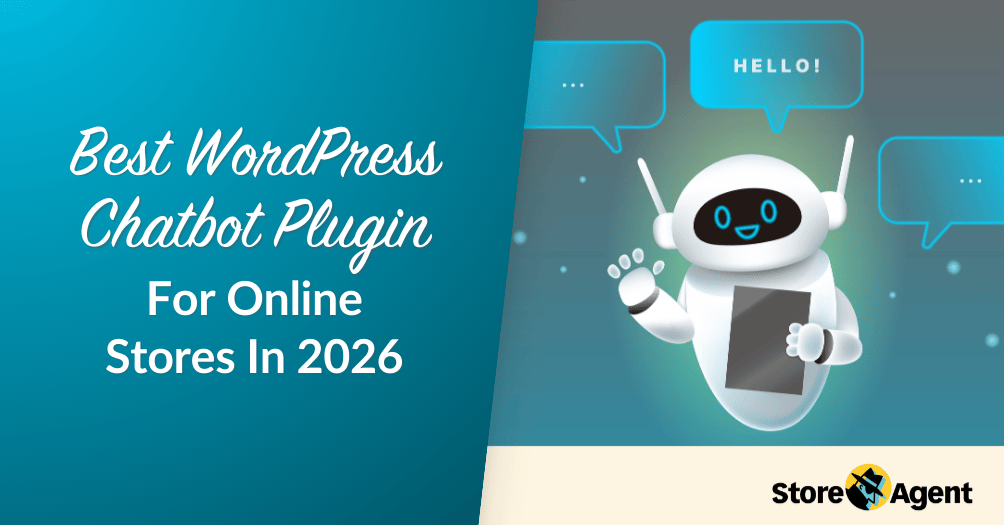
When searching for the best WordPress chatbot plugin, it pays to choose one built for product-aware, real-time answers that lighten support workload and help shoppers buy confidently.
Modern chatbots for WooCommerce can instantly respond to customer questions about pricing, stock, and product details, freeing store teams to focus on growth. In fact, companies are projected to save up to $11 billion and nearly 2.5 billion hours globally by using chatbots, highlighting their powerful impact on ecommerce efficiency.
I’ve tested every major WordPress chatbot plugin in live stores, assessing both AI-driven features and hands-on usability. My goal was simple: find out which plugins actually deliver practical value for WooCommerce sites, whether you’re a solo merchant or managing a busy team.
In this guide, we’ll go through the best WordPress chatbot plugins for online stores in 2026, focusing on options built for WooCommerce. Each one has a slightly different strength, so by the end, you’ll know which one fits your store best.
Scan the table below to see a clear side-by-side feature breakdown. Then read on for hands-on reviews and testing insights.
| Plugin | WooCommerce Support | AI Options | Pricing | Best For |
|---|---|---|---|---|
| StoreAgent Chat | ✅ Direct catalog sync, order tracking | Custom AI tuned for WooCommerce | $49/mo, Custom | Stores that want product-aware chat |
| Tidio | ✅ Order history + cart recovery | Lyro AI (higher tiers) | Free → $2,999/mo | Stores needing live chat + bot mix |
| HubSpot | ✅ With WooCommerce integration | Rule-based + CRM-driven | Free → Paid from $20/mo | Stores already using HubSpot CRM |
| AI Engine | ⚠️ Needs prompt tuning | OpenAI models (ChatGPT, DaVinci) | Free, $49/yr | Stores wanting flexibility + AI sandbox |
| WPBot | ✅ WooCommerce module add-on | Dialogflow + OpenAI | Free, $49/yr | Stores wanting native WP chatbot |
Table Of Contents
What Is A WordPress Chatbot Plugin?
A WordPress chatbot plugin is software that adds an interactive chat assistant to your website. Instead of waiting for a reply by email or phone, visitors can ask questions directly in the chat widget and get instant answers any time of day.
Why does this matter?
Because online shoppers rarely wait around. If they can’t find the answer to “Does this come in medium?” or “When will this ship?” they’re more likely to leave than to dig through a FAQ page.
The newer generation of chatbots are powered by AI for ecommerce, meaning they can understand natural language, access product details from WooCommerce, and deliver answers that sound human.
In short, the best WordPress chatbot plugin can lighten your support team’s load while giving shoppers a smoother buying experience.
The Best WordPress Chatbot Plugins For Online Stores In 2026
Now that we’ve covered why chatbots matter for WooCommerce, let’s look at the plugins that stand out this year.
We’ll go through a mix of free and paid options, each bringing its own strengths to customer support, automation, or product-aware conversations.
The best way to decide? Test a few plugins in your own store environment. That’s the quickest way to see which one feels like the best fit for your workflow and your customers.
1. StoreAgent
StoreAgent is the best WordPress AI chatbot plugin built specifically for WooCommerce stores. It connects directly to your WooCommerce catalog and live order data, allowing customers to get instant, accurate answers about product availability, pricing, variants, and order status.
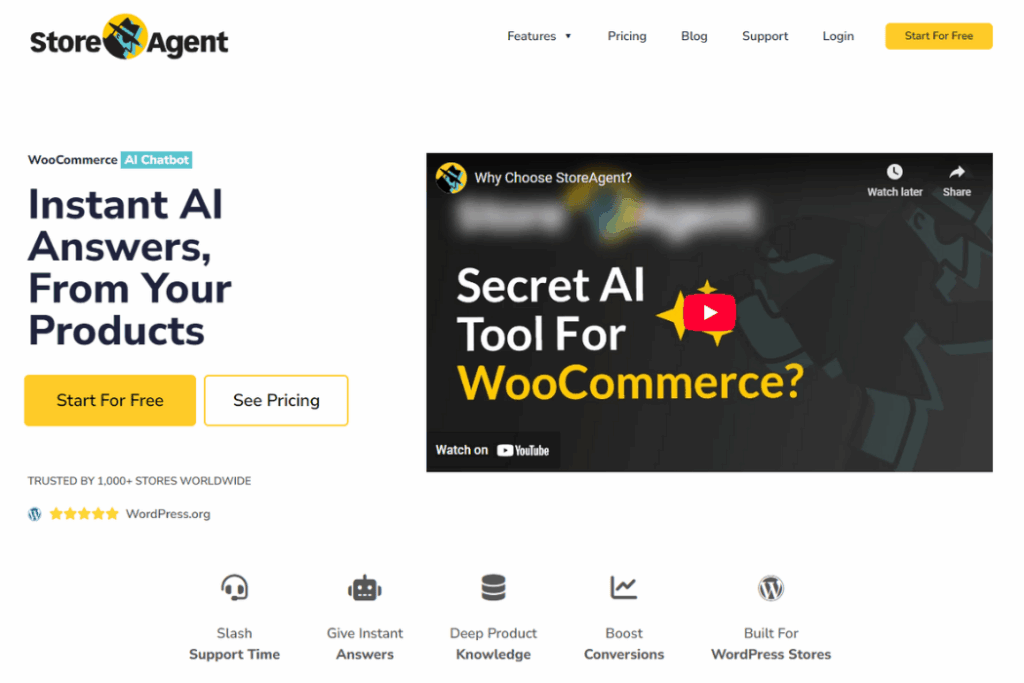
How I Tested
I connected StoreAgent Chat to a live WooCommerce store and asked typical customer questions about product availability, pricing, and variants. The bot responded accurately and contextually, perfectly matching the store’s tone while delivering real-time stock and pricing information.
Key features:
- Live catalog & order sync: Provides real-time answers on product availability and pricing by syncing with your WooCommerce catalog. It can also fetch live order data.
- Fully multilingual conversations: Natively understands and responds in dozens of languages.
- Conversation memory & control: Keeps context so follow-up questions feel natural. Site owners can clear the AI Memory from their account.
- Tone control: Adjust replies from casual to professional to fit your brand.
- Widget styling: Customize colors and icons to match your storefront.
- Advanced chat history: Review chat logs to understand customer needs.
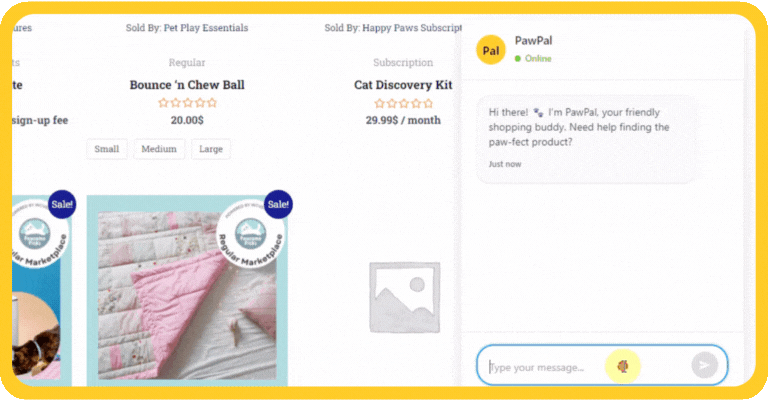
Why I Recommend It
StoreAgent Chat provides accurate, product-specific AI answers that significantly reduce support workload. For WooCommerce stores needing real-time catalog integration and a natural chat experience, it is the best AI chatbot for customer service.
Pricing:
- Lite – Free: Includes 50 WooCommerce AI chat replies, 100 memory items, and 25 AI content tasks. Use on unlimited websites.
- Growth – $19/month: Includes 500 AI chat replies, 5,000 memory items, and 500 AI content tasks.
- Pro – $49/month: Includes 5,000 AI chat replies, 25,000 memory items, and 2,500 AI content tasks.
- Business – $249/month: Includes 50,000 AI chat replies, 100,000 memory items, and 10,000 AI content tasks.
Check out this guide for a full walkthrough: Introducing StoreAgent Chat: AI Chat For WooCommerce Stores
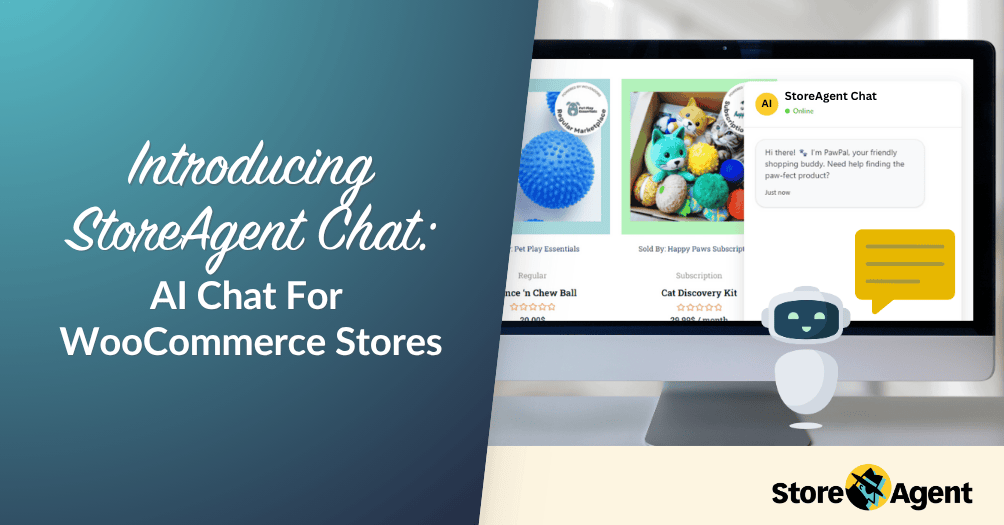
🤖 See StoreAgent in Action: Reading about features is one thing, but seeing them live is another. Interact with our StoreAgent Chat Demo to experience for yourself why a product-aware AI chatbot is a game-changer for WooCommerce stores.
2. Tidio
Tidio offers a versatile WordPress chatbot plugin that combines AI-powered automation with live chat support, making it a popular choice for WooCommerce stores that want flexibility in customer communication.
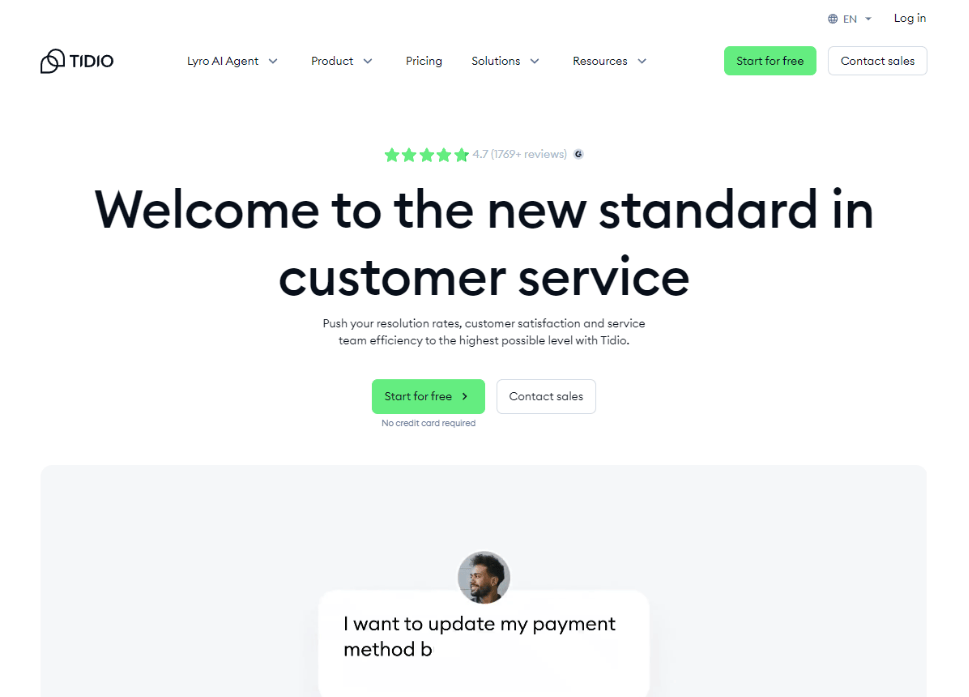
How I Tested
I set up Tidio on a WooCommerce site and created automated chatbot flows to recover abandoned carts and answer common customer questions. The hybrid model worked smoothly, providing real-time assistance and allowing easy handoff to live agents when needed.
Key features I noticed in testing:
- Hybrid model: Combine chatbot automation with live chat.
- WooCommerce integration: Access order history and customer data inside chat.
- Prebuilt templates: Abandoned cart recovery, FAQs, and lead capture flows.
- Mobile app: Manage live chats from anywhere.
- Multichannel support: Connect website chat with Messenger and email.
Why I Recommend It
Tidio excels at balancing automation and personal support. For WooCommerce stores that want to reduce workload while maintaining live interaction and multichannel reach, Tidio offers a powerful, scalable solution.
Pricing:
- Free — $0/month: 50 handled conversations, live chat, help desk, and 50 one-time Lyro AI conversations.
- Starter — $24.17/month (billed annually): Includes 100 handled conversations, basic analytics, live visitors list, operating hours, plus the Free plan features.
- Growth — $49.17/month (billed annually): Expands to 2,000 handled conversations, advanced analytics, power features, permissions, plus everything in Starter.
- Plus — $749/month (contact sales): Custom conversation quota, dedicated success manager, multisite support, multilingual features, OpenAPI, and up to 5,000 Lyro AI conversations.
- Premium — $2,999/month (contact sales): Unlimited handled conversations, guaranteed 50% AI resolution rate, priority support, super-admin roles, advanced analytics, and Lyro AI as a managed service.
3. HubSpot WordPress Chatbots
HubSpot WordPress Chatbots integrate your website and CRM system with live chat and chatbot automation, offering an all-in-one solution for lead capture and customer engagement on WooCommerce stores.
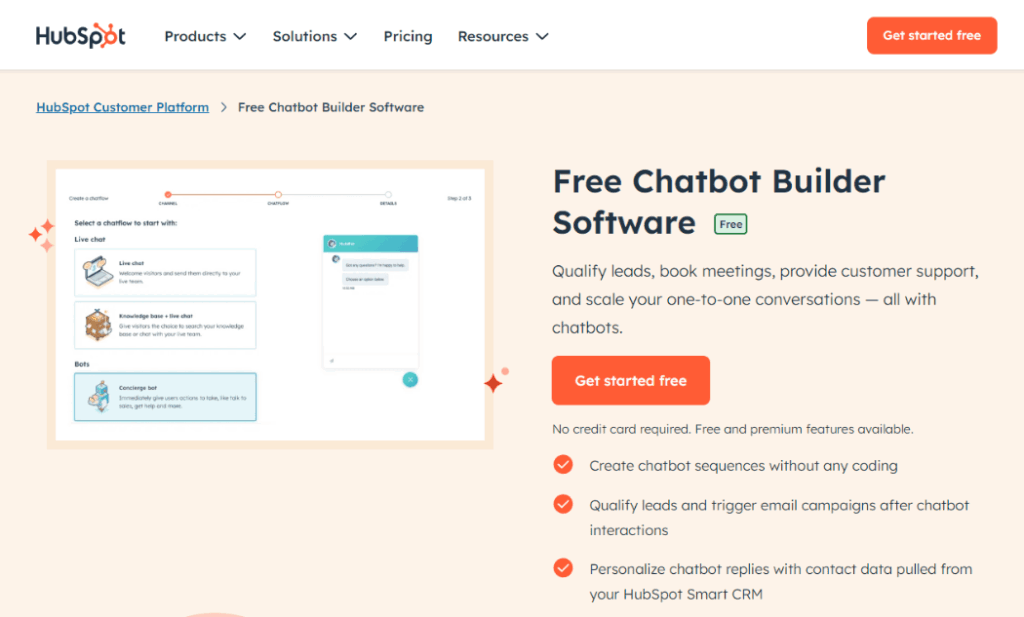
How I Tested
I installed the HubSpot plugin on a WooCommerce site and quickly set up chatbots to qualify leads, capture visitor information, and schedule meetings. The chat syncs automatically with HubSpot CRM, providing seamless follow-up opportunities.
Key features I noticed in testing:
- Easy integration: Install via Plugins > Add New, then connect your HubSpot account, and the chat widget appears automatically.
- Chatflows builder: Use HubSpot’s visual flow editor to create bots that qualify leads, book meetings, or answer common questions. Specify which WordPress pages they should appear on.
- CRM sync: Every chat converts into a contact in your HubSpot CRM, complete with conversation context for follow-ups.
- Templates included: Choose from lead qualifiers, booking bots, support bots, and concierge flows.
HubSpot’s chatbot plugin is best for WooCommerce stores prioritizing lead management and marketing automation alongside customer chat.
Why I Recommend It
For stores already using HubSpot CRM, this chatbot plugin streamlines lead capture and nurturing through synchronized conversations. If your focus is CRM-driven marketing rather than deep product catalog support, HubSpot is an excellent fit.
- Free plan: Includes live chat, basic chatbots, forms, CRM, and analytics.
- Starter plan: Begins at $20/month (billed annually), unlocking more automation and support.
4. AI Engine WordPress Chatbot Plugin
AI Engine by Jordy Meow offers a highly flexible WordPress chatbot plugin that leverages OpenAI models like ChatGPT to provide intelligent, customizable chatbot functionality on WooCommerce sites.
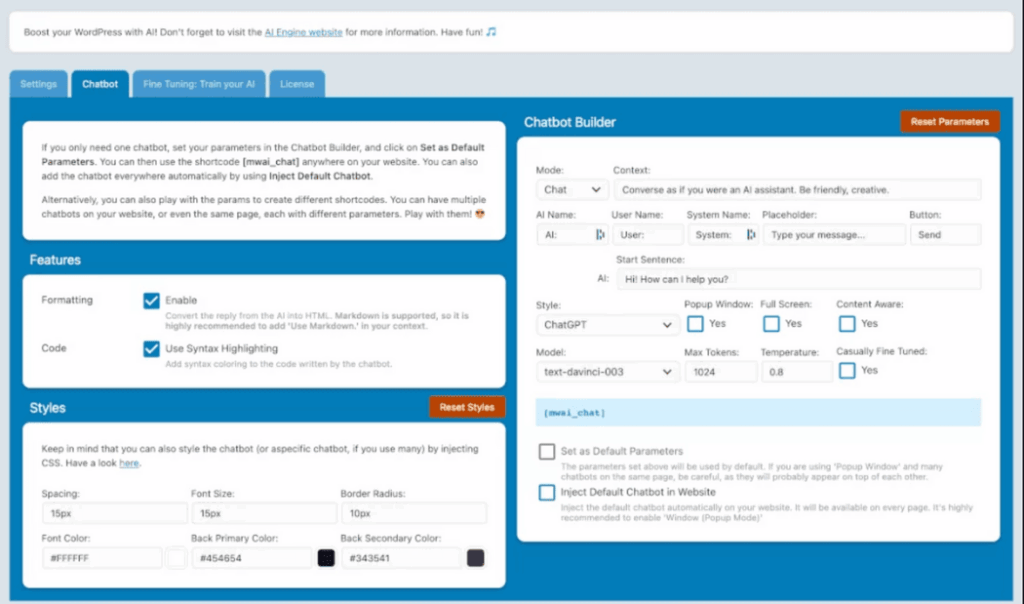
How I Tested
I set up AI Engine on a demo WooCommerce store and configured ChatGPT-powered chatbots to answer common product questions and handle multi-language requests. While it required some prompt tuning to optimize responses, the plugin delivered accurate and context-aware answers tailored to ecommerce needs.
Key features I found useful in testing:
- OpenAI support: Connects with ChatGPT, DaVinci, and other models.
- Custom templates: Build reusable conversation flows.
- Multi-language support: Handle customers in multiple regions.
- Design control: Tweak chat icons, avatars, and styling to fit your brand.
- Developer-friendly: Internal API for extending features.
AI Engine feels like a sandbox for experimenting with AI on WordPress. It’s flexible and powerful, but it’s not a plug-and-play WooCommerce chatbot.
You’ll need to put in some prompt tuning to get the best results. If you enjoy tweaking settings and want a chatbot you can fully mold, this plugin gives you that freedom.
Why I Recommend It
If you enjoy experimenting with AI and want a fully customizable chatbot for WooCommerce, AI Engine offers powerful flexibility. It’s ideal for developers and store owners looking to tailor chatbot interactions beyond out-of-the-box solutions.
Pricing:
- Pro: $49/year with extended customization and advanced options.
- Free: Includes core AI chatbot functionality.
5. WPBot AI Chatbot
WPBot is a native WordPress chatbot that runs fully inside your dashboard. It’s designed to work out of the box for FAQs and support, but with the WooCommerce add-on module, it can also handle product search, order lookups, and cart interactions.
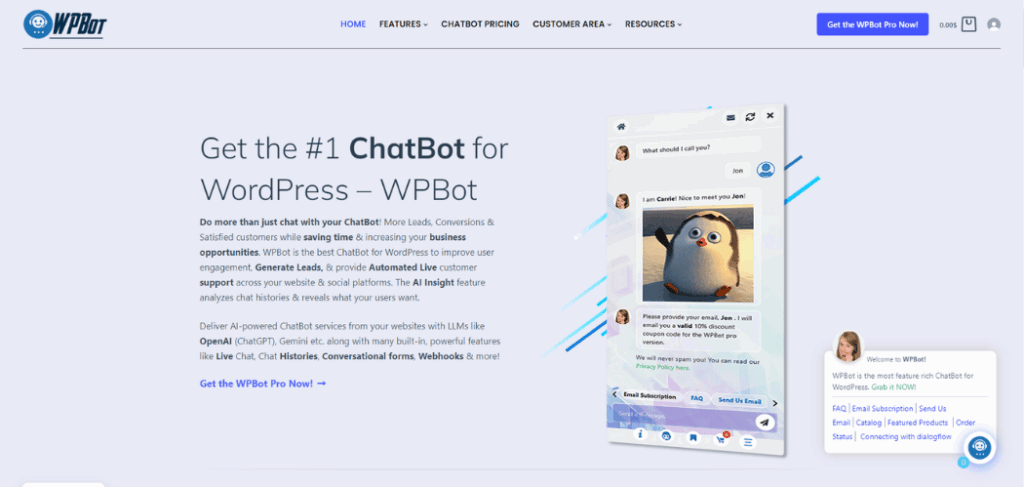
How I Tested
I installed WPBot Lite and had a basic FAQ chatbot up and running within minutes. After adding the WooCommerce module, the bot could recommend products, display ongoing sales, and assist customers with order tracking.
Key features for WooCommerce stores:
- Native WordPress plugin: Simple to install and manage from the dashboard.
- AI-powered responses: Optional Dialogflow or OpenAI integration for natural conversations.
- WooCommerce module: Add product search, featured items, sales, and order tracking.
- Behavior triggers: Show chatbots based on exit intent or time on page.
- Multi-channel support: Extend chat to Messenger, WhatsApp, and Telegram.
Why I Recommend It
If you are looking for a lightweight, easy-to-use WordPress-native chatbot that can grow into WooCommerce support, WPBot offers a cost-effective solution with flexible AI integration options.
Pricing:
- Free (Lite): Basic chatbot features for FAQs.
- Pro: Starting at $49/year with advanced triggers, integrations, and WooCommerce add-ons.
Key Features For An AI Chatbot For Customer Service
Not every chatbot is built the same way, and not every store needs the same features. If you’re trying to choose the best WordPress chatbot plugin, it helps to focus on the functions that actually make a difference for online stores.
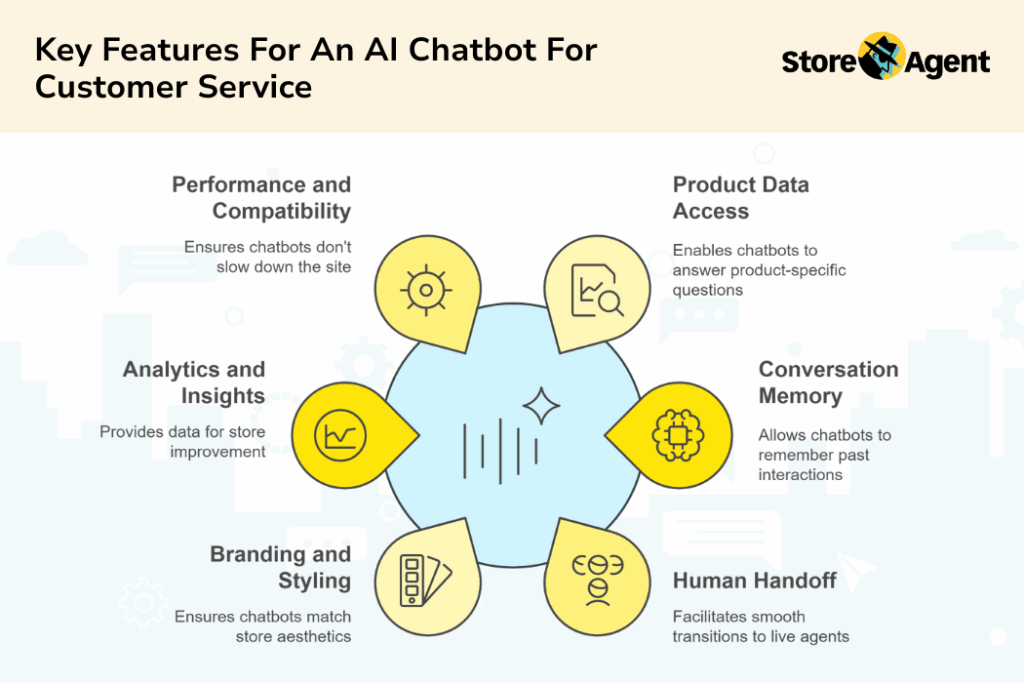
1. Product data access
An AI chatbot for customer service that connects with WooCommerce can answer product-specific questions like price, availability, or variations.
If it can’t answer simple questions like “Do you have this in stock?” or “What’s the price for a medium size?” then it won’t reduce much support workload.
2. Conversation memory
The best WordPress chatbot plugin can remember. If a customer asks about a T-shirt in medium size and then follows up with, “Do you have it in blue?”, memory makes that interaction feel natural instead of starting from scratch.
3. Human handoff
AI chatbots don’t have to do everything alone. The best setups allow a smooth transition to a live agent whenever the bot gets stuck. This avoids frustrating loops and reassures customers that a real person is available if needed.
4. Branding and styling
Chat widgets should feel like part of your store, not an out-of-place popup. The ability to match your colors, fonts, and tone helps build trust and keeps the shopping experience consistent.
5. Analytics and insights
Every customer question is a data point. With the right reporting, you can spot patterns like repeated shipping questions or missing product details — and use that to improve your store.
6. Performance and compatibility
The best WordPress chatbot plugin shouldn’t slow down your site or break your WordPress theme. Lightweight plugins that work well with caching and WooCommerce are safer choices, especially during high-traffic sales periods.
Related Article
To learn more about how AI chatbots can benefit your store, see our complete guide on the Benefits Of Using AI Chatbots.
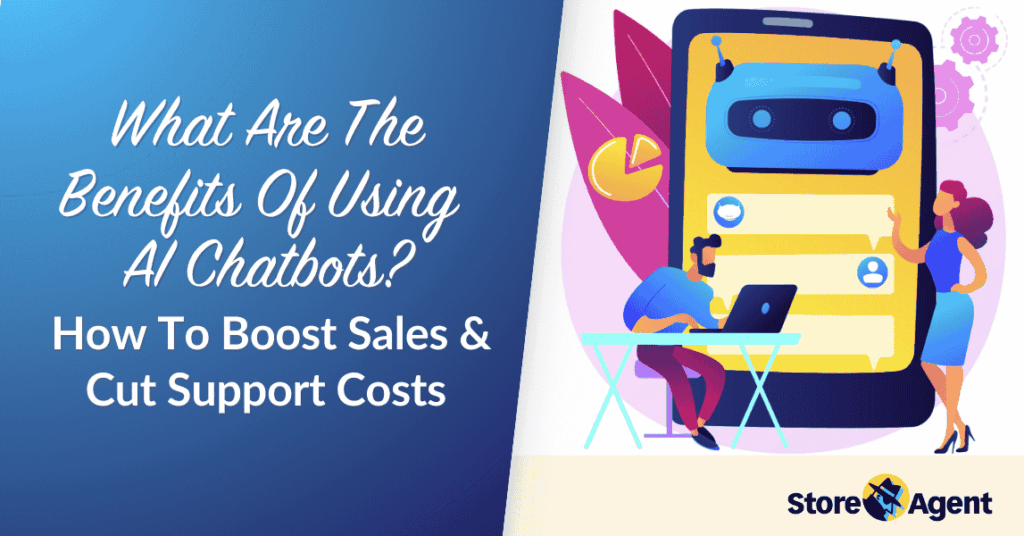
Conclusion
Finding the best WordPress chatbot plugin comes down to your store’s goals. Do you need a live chat and bot mix? A CRM-connected chatbot? Or an AI assistant that knows your products inside out?
Here are the best WordPress chatbot plugins for online stores so far:
Each of these plugins can help improve how you handle customer conversations.
But if you’re running a WooCommerce store and need real product-aware support, StoreAgent Chat is the AI chatbot for customer service that is built specifically for that job. It delivers accurate catalog answers, smooth conversations, and a setup that feels like a natural part of your store.
If you’re ready to try it for yourself, interact with the StoreAgent Chat Demo, and then explore our plans to see which one fits your store best.
Frequently Asked Questions (FAQs)
Do chatbots help SEO directly?
They don’t change indexable content, but they improve UX signals that correlate with revenue: lower exits on PDPs, more confident buyers, and fewer support bottlenecks. Some also surface gaps in your content you can fix for organic gains.
Which is the best WordPress chatbot plugin for small WooCommerce teams?
Pick an AI chatbot for customer support that’s product-aware and doesn’t need constant agent coverage. If you only want accurate product-catalog answers such as price, stock, attributes, and variants, StoreAgent Chat is the straightforward choice. It syncs with WooCommerce, handles common pre-sale questions on its own, and is easy for lean teams to maintain.
Can a chatbot recommend products and increase AOV?
Yes. A chatbot that is product-aware can suggest related products, highlight bundles, and clarify variants directly on product and cart pages.
StoreAgent Chat is a strong choice if you want this capability in WooCommerce. Because it connects directly to your product catalog, it can recommend upsells and cross-sells in real time without manual setup. For many small and mid-sized stores, this makes StoreAgent the best WordPress chatbot plugin for driving higher revenue while keeping support simple to manage.
Do WordPress chatbot plugins support multilingual stores?
Yes. Many chatbots work with multiple languages through built-in settings or integrations with translation plugins. An example is StoreAgent Chat, which uses AI to naturally understand and respond in different languages, making it a strong fit for multilingual WooCommerce stores.
Do WordPress chatbots work on mobile?
Yes. Most modern chatbot plugins are mobile-friendly by default. They adapt to your store’s theme and work smoothly on smartphones and tablets.
